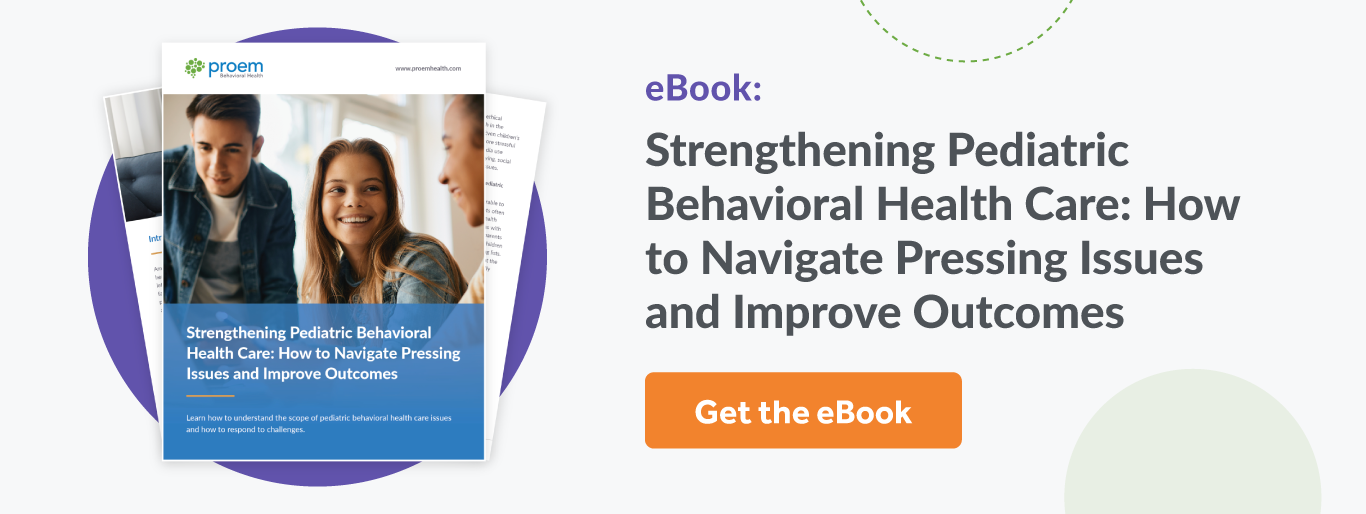Quality children's behavioral therapy is vitally important to healthy development, and there is an increasing number of children in need of such services. Nonprofit safety organization ECRI called the pediatric mental health crisis its top concern for 2023.

Nearly one in seven children aged 2 to 8 years old have a diagnosable mental, behavioral, or developmental condition. That number rises to one in five among 9- to 17-year-olds.
Sadly, the lag time between symptom onset and intervention for children is eight to 10 years — approximately half of childhood. To help close that gap, we identify five opportunities to improve identification of child disorders and provide better children's behavioral therapy.
Opportunities to Improve Behavioral Therapy for Children
1. Improve mental health care training and competence for pediatricians
Improving mental health competencies at the point of care has become a national priority for the American Academy of Pediatrics (AAP). A few years ago, the organization issued a policy statement recommending specific mental health competencies for all pediatric practitioners, including primary care providers and specialists.
AAP calls for more focused training in mental health care, beginning at the medical school level and continuing throughout the career lifespan. Students and early-career physicians should learn foundational communication skills that help pediatricians build positive therapeutic alliances and motivate patients and families to make positive changes.
By internalizing this approach, developing clinicians learn to build trust with families and integrate mental health conversations into the standard care workflow.
AAP's statement also includes a standardized flowchart to help pediatricians implement the correct care. It guides clinicians through the process of screening and points them toward appropriate next steps. When used correctly and combined with ongoing clinical training, this kind of resource can help pediatric practices provide every child with the right mental health services.
2. Establish integrated care models in pediatric practice
One of the most effective ways for pediatricians to build skills and provide better mental health care is to partner with local mental health providers. There are a few approaches one can take to achieve effective integration.
Collaborative care model
The ideal format is a true collaborative care model, as described by the American Psychiatric Association (APA). This patient-centric format involves comprehensive physical and mental health care delivery at a comfortable location, with providers collaborating on a shared care plan.
In a collaborative care setting, pediatricians and mental health care providers share a defined caseload. They work together to develop clinical goals and treatment plans with the support of a psychiatric consultant. Practices carefully track patient progress and adjust treatment strategies based on improvement levels.
This model improves mental health access by incorporating it in the primary care setting. It also gives mental health specialists and pediatricians the unique opportunity to share skills and knowledge. Research supports the effectiveness of this model in many different populations, including ethnic and racial minority communities.
Other integrated care models
Where a fully collaborative care model is impossible or impractical, experts recommend partially integrated co-located care. Regular contact between providers, even when not working on similar cases, can improve mutual skill-building. It also provides opportunities for sharing resources, including anxiety assessment tools for youth.
Many states have also implemented a child psychiatry access program (CPAP). Originally developed in Massachusetts, the CPAP system gives clinicians access to convenient psychiatric phone consultations. These systems allow pediatricians to provide quality behavioral therapy for children, even in the absence of qualified local therapists.
3. Advocate for mental health funding and policies in school systems
The school setting presents a unique opportunity for mental health screening and children's behavioral therapy. Teachers and other student-facing personnel are in an optimal position to get to know students and identify child disorders early.
Studies have shown that students are substantially more likely to receive mental health services when those services are available at school. Those students who receive school mental health services have better academic and social outcomes and are more likely to have positive school experiences.
To support schools in making the most of this advantage, the National Conference of State Legislatures (NCSL) recommends a comprehensive school mental health system that includes the following:
- Specialized instructional staff trained in supporting students' mental health needs
- Collaboration with families, community partners, legislators and funders
- Ongoing student needs assessments like adolescent anxiety screening, paired with evidence-based services where needed
NCSL recognizes that funding this type of system can be challenging, particularly for less well-resourced school systems. Among schools that feel ill-equipped to provide quality mental health care, 48% cite funding as a barrier and 57% cited a lack of access to providers.
To help close this gap, the National Center for School Mental Health has published a "funding and sustainability quality guide." The guide promotes the combination and integration of multiple funding streams. NCSL also recommends the full use of Medicaid funding, which schools can use to provide services to Medicaid-enrolled students.
 Follow Proem Behavioral Health on LinkedIn to help you stay current with the latest behavioral and mental health news.
Follow Proem Behavioral Health on LinkedIn to help you stay current with the latest behavioral and mental health news.
4. Involve families in behavioral therapy for children
Families affect the outcome of pediatric behavioral health care on every level. Unlike in adult care, where patients often bring themselves in for evaluation, it's typically a parent or caregiver who notices a potential issue with a child or adolescent and brings it up with a medical professional. That professional is the general practice pediatrician in three out of four cases, according to the American Academy of Child and Adolescent Psychiatry (AACAP).
If an issue is present, many families face significant financial and logistical barriers to care. Resources at the primary care level can go a long way toward helping caregivers better meet their pediatric patients' behavioral health needs.
It's also essential to involve parents throughout the care delivery process. Multiple studies have shown that pediatric behavioral health interventions have better outcomes when parents and guardians are involved. Parents need the resources to support skills learning and emotional intelligence outside the clinician's office.
5. Improving children's behavioral therapy with routine assessments
Imagine a world where every provider had access to a quality pediatric anxiety screening tool. How many children with anxiety would get the help they need? Pediatricians need the tools and competencies to perform mental health screenings and assessments in the primary care setting, whether parents bring up concerns. The importance of pediatric anxiety screening was highlighted by the U.S. Preventive Services Task Force (USPSTF) when it issued new behavioral health-related recommendations for primary care physicians, one of which was the recommendation that children and adolescents aged 8 to 18 years should be screened for anxiety.
Quality behavioral therapy for children starts with reliable routine assessments. At Proem, we've developed convenient screening tools, including depression screeners and anxiety assessment tools for youth. Families can complete these tools in under three minutes at the point of care, greatly improving access and helping start children on a path to recovery. Contact us today to learn more about the Proem evidence-based clinical workflow software engine. 





.png)








